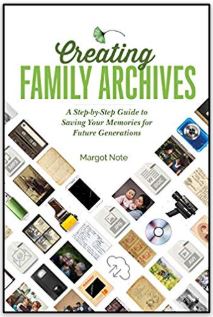If you are the keeper of family history items that you believe could be of interest to scholars, you may wish to donate them to an institution where they will be archived and available for others to use.
The Society of American Archivists (SAA) provides an excellent Web site with general information about collections and donations. Look specifically for the SAA publication “A Guide to Donating Your Personal or Family Papers to a Repository.”
More and more archives, libraries, and museums are reaching out to families with encouragement to donate. They recognize that we are the source and subjects of social history.
DONATION CONSIDERATIONS
Here are some tips to consider before you donate:
Most repositories use professional standards, trained archivists and conservators, and archival supplies and environments. Ask whether they do. They can provide a safer home for our documents than we can.
If you are unsure of the most appropriate repositories in your area, reach out to your state historical society for recommendations.
Many archivists would rather you not organize, sort, or discard your materials before you contact them. They will do the cataloging themselves.
A repository may accept anywhere from a single item to an extensive collection if they deem it relevant and worthy of preservation.
Most archives will ask you to transfer ownership to them as well as copyright of the collection. You can request to retain copyright for a period, but researchers will be reaching out to you to seek your permission to publish anything from your collection. The inconvenience for them and you is a good reason to transfer copyright. Make sure that the copyright is yours to transfer. It first belongs to the creators of the documents and their heirs.
Repositories will ask you to sign a deed of gift to keep the agreement unambiguous and legal. Most public archives can’t spend their resources to maintain your collection for you, so they want to “own” it for public access to justify their investment of resources. Again, the repository may seek evidence from you that you truly own and have the rights to donate the collection.
Archivists prefer that you allow unrestricted access to your collections, but if there is a reason to keep something private you may arrange such specifications for a period. Don’t self-censor your records; discuss with the archivists about limiting access to sensitive materials.
If your documents are recent enough that privacy laws may apply, consult with the archivists whether there is private information about anyone they need, by law, to protect. Such documents might include medical, school, tax, or legal records.
As they process the collection, the repository staff will make decisions about whether to discard some items as valueless. You can state in advance what you want them to do with the discards, including that they might return them to you.
You may wish to determine a monetary value of your collection so you can take a charitable tax donation. Seek tax experts or attorneys for advice. You may need to hire a personal property appraiser. The Internal Revenue Service requires an independent appraisal if you value the donation above a certain amount. The archives cannot provide this service but may keep a list of appraisers. For tax purposes, make sure you get receipts.
You may also wish to offer a monetary donation to the repository to help support the care of the collection.
Be kind to archivists. Many institutions are understaffed, and archival staff members wear many hats.
Visit Margot’s website to learn more: MargotNote.com
 What are you doing to make history?
What are you doing to make history?
To learn the preservation secrets used by libraries, archives, and museums to protect their priceless materials (that you can also use for your family heritage items) read Margot’s book:
Creating Family Archives: A Step-by-Step Guide to Saving Your Memories for Future Generations By Margot Note


